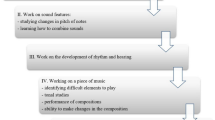Abstract
This study investigates the use of musical intelligence to improve the English pronunciation of Chinese third level students. It is relevant for a human-centred systems engineering approach to cross-cultural interaction. Language learning is important as valid communication can help interactions and cultural understanding between countries, this also may benefit international stability. There are natural barriers between the English and Chinese language which are reflected in teaching approaches. The teaching of English in Chinese classrooms is removed from real-world English learning environments. The academic environments and approaches focus on the learning of grammar, spelling and writing with little real-life conversation and interaction with native English speakers. English language learning in China is from a more academic perspective rather than practical utilisation. Correct pronunciation and accent is therefore diminished. This study demonstrates that a musical intelligence e-Learning approach can benefit Chinese English language students.


Similar content being viewed by others
References
Adhikari S (2011) Current trends in e-Learning. Available at: http://elearningconcepts.wikispaces.com/Current+Trends+in+E-Learning. Accessed at 8 Mar 2011
Brick J (2004) China: a handbook in intercultural communication. Macquarie University, Sydney
Butzlaff R (2000) Can music be used to teach reading? J Aesthet Educ 34:3–4
Eufrocina L, Paulcoto M (2008) Common errors in English (words mispronounced)—ESL lesson. [Online] available at: http://www.eslteachersboard.com/cgi-bin/lessons/index.pl?read=910 (accessed at 16th Mar 2011)
Fisher D (2001) Early language learning with and without music. Read Horiz 42(1):39–49
Frith U (1985) Beneath the surface of developmental dyslexia. In: Patterson KE, Marshall JC, Coltheart M (eds) Surface dyslexia. Lawrence Erlbaum, Hove, pp 301–330
Gardner H (1983) Frame of mind: the theory of multiple intelligences. Basic Books, New York
Gardner H (2000) Intelligence reframed: multiple intelligences for the 21st century. Basic Books, New York
Ginsburgh V (2005) Languages genes, and cultures. J Cult Econ 29:1–17
Guglielmino LM (1986) The affective edge: using songs and music in ESL instruction. Adult Lit Basic Educ 10(1):19–26
Harris CD (2001) English as international language in geography: development and limitations. Geogr Rev 91(4):675–689
IELTS Speaking Band Descriptors (public version) (2009) Available at http://www.ielts.org/PDF/UOBDs_SpeakingFinal.pdf (accessed at 15 Sept 2011)
Le Breton M, Weber S (2003) The art of making everybody happy: how to prevent a secession. IMF staff papers 50(3):403–435
Logsdon A (2010) Musical learning styles—understanding musical learning styles. Available at: http://learningdisabilities.about.com/od/resourcesreseach/qt/musical_learner.htm (accessed 22 Dec 2010)
Mills S (2001) The role of musical intelligence in a multiple intelligences focused elementary school. Int J Educ Arts 2:4
Moreno S (2009) Can music influence language and cognition? Contemp Music Rev 28(3):329–345
Oh CH (2003) Information communication technology and the new university: a view on e-Learning. Ann Am Acad Polit Soc Sci 585:134–153
Oxford University Press (1991) The concise Oxford dictionary. BCA, London
Quast U (1999) The effect of music on acquiring vocabulary with technically gifted students. Gifted Educ International 14(1):12–21
Richard-Amato PA (2003) Making it happen: from interactive to participatory language teaching, theory, and practice, 3rd edn. Pearson Education, White Plains
Salcedo C (2010) The effects of songs in the foreign language classroom on text recall, delayed text recall and involuntary mental rehearsal. J Coll Teach Learn 7(6):19–30
Shoebottom P (2011) The difference between English and Chinese. [Online] available at: http://esl.fis.edu/grammar/langdiff/chinese.htm (accessed at: 20 Oct 2010)
Sloboda JA (1990) Music as a language. In: Wilson FR, Roehmann FL (eds) The biology of music making: proceedings of the 1987 Denver conference. MMB Music, St. Louis, pp 28–43
Smith MK (2002) Howard Gardner and multiple intelligences, the encyclopedia of informal education. Available at: http://www.mfed.org/thinkers/gardner.htm (accessed 27 Dec 2010)
Stokes J (2008) The effects of music on language acquisition. CELE J 16:23–32
Wallace WT (1994) Memory for music: effect of melody on recall of text. J Exp Psychol Learn Mem Cogn 20(6):1471–1485
Wang S (2007) Teaching English as a second language in China/Enseignement De L’anglais Comme La Seconde Langue Etrangere En Chine. Can Soc Sci 3(3):106–108
Yeh A (2005) New dawn in a shared language: the ascent of English part 2: China: many more Chinese are learning English to further their opportunities, driving the market for education, says Andrew Yeh. Financial Times, 13th, April, p 12
Zhao BH (2010) How to enhance cross-cultural awareness in TEFL. Cross Cult Commun 6(2):100–104
Author information
Authors and Affiliations
Corresponding author
Rights and permissions
About this article
Cite this article
Wu, L., McMahon, M. Adopting a musical intelligence and e-Learning approach to improve the English language pronunciation of Chinese students. AI & Soc 29, 231–240 (2014). https://doi.org/10.1007/s00146-013-0479-6
Received:
Accepted:
Published:
Issue Date:
DOI: https://doi.org/10.1007/s00146-013-0479-6




